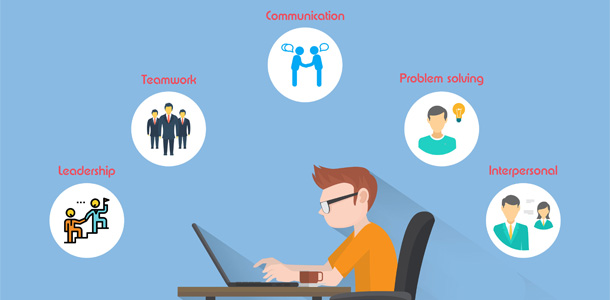How to Improve Your Soft Skills as a Project Manager
17 September 2024
Blog

How to Improve Your Soft Skills as a Project Manager
Project management is a multifaceted discipline that requires a blend of technical expertise and interpersonal finesse. While technical skills are crucial for planning and executing projects, soft skills – the intangible qualities that enable effective communication, collaboration, and leadership – often distinguish exceptional project managers from the rest. In this article, we will explore actionable steps and strategies to help you improve your soft skills and excel in your project management role.
I. The Foundation: Self-Awareness and Reflection

The first step towards improving your soft skills is to cultivate self-awareness. Understanding your strengths, weaknesses, communication styles, and leadership approaches is crucial for identifying areas for growth.
Seek Feedback: Actively solicit feedback from colleagues, team members, and supervisors. Honest feedback can provide valuable insights into how your behaviors and actions are perceived by others.
Self-Reflection: Regularly reflect on your interactions and experiences. Consider how your communication style impacts others, how you handle conflicts, and how you motivate and inspire your team.
Personality Assessments: Utilize personality assessments like Myers-Briggs Type Indicator (MBTI) or DiSC to gain a deeper understanding of your personality traits and communication preferences.
II. Mastering Communication

Effective communication is the cornerstone of successful project management. Here’s how to enhance your communication skills:
Active Listening: Focus on truly understanding what others are saying, not just waiting for your turn to speak. Paraphrase what you hear to ensure clarity and demonstrate attentiveness.
Empathy: Put yourself in others’ shoes to understand their perspectives and emotions. Empathetic communication fosters trust and builds stronger relationships.
Clarity and Conciseness: Avoid jargon and overly complex language. Communicate your ideas clearly and succinctly, ensuring everyone understands.
Adaptability: Tailor your communication style to different audiences. Some individuals prefer direct communication, while others may respond better to a more collaborative approach.
III. Cultivating Leadership

Project managers are leaders who inspire and motivate their teams. Here’s how to develop your leadership skills:
Set a Clear Vision: Articulate a compelling vision for the project, outlining its goals and benefits. A clear vision inspires and aligns team members towards a common purpose.
Empower Your Team: Delegate tasks, provide autonomy, and trust your team members to deliver. Empowering others fosters a sense of ownership and accountability.
Recognize and Reward: Acknowledge and appreciate individual and team accomplishments. Recognizing contributions boosts morale and motivates continued excellence.
Provide Constructive Feedback: Offer feedback that is specific, actionable, and focused on improvement. Constructive feedback helps individuals grow and develop.
IV. Enhancing Problem-Solving and Decision-Making

Project managers are constantly faced with challenges and decisions. Here’s how to improve your problem-solving and decision-making abilities:
Analyze Root Causes: When problems arise, delve deeper to identify the underlying causes. Addressing root causes prevents recurring issues and leads to more effective solutions.
Brainstorm Solutions: Encourage creative thinking and involve your team in generating potential solutions. Brainstorming fosters collaboration and generates diverse ideas.
Weigh Risks and Benefits: Evaluate the potential risks and benefits of each solution before making a decision. Consider the impact on project timelines, budget, and stakeholder satisfaction.
Make Timely Decisions: Avoid procrastination and make decisions in a timely manner. Indecisiveness can hinder progress and create unnecessary delays.
V. Nurturing Negotiation and Conflict Resolution Skills

Projects often involve competing interests and priorities. Here’s how to improve your negotiation and conflict resolution skills:
Active Listening: Listen to all perspectives and seek to understand the underlying interests and concerns of each party involved.
Focus on Interests, Not Positions: Identify the underlying needs and desires that drive each party’s position. This allows for creative problem-solving and mutually beneficial solutions.
Find Common Ground: Look for areas of agreement and shared interests. Building on common ground can facilitate compromise and collaboration.
Mediate Impartially: If conflict arises, remain neutral and facilitate open communication between the parties involved. Help them find a resolution that satisfies everyone’s needs.
VI. Embracing Adaptability and Flexibility

The project management landscape is constantly changing. Here’s how to cultivate adaptability and flexibility:
Embrace Change: Be open to new ideas, technologies, and methodologies. Resist the urge to cling to familiar approaches and be willing to experiment.
Continuous Learning: Stay abreast of industry trends, attend workshops, and pursue professional development opportunities. Continuous learning is essential for staying relevant and adaptable.
Contingency Planning: Anticipate potential risks and develop contingency plans to address them. Being prepared for the unexpected helps you navigate challenges with confidence.
VII. Additional Tips for Enhancing Soft Skills

Seek Mentorship: Find a mentor who can offer guidance, support, and insights based on their experience.
Join Professional Organizations: Connect with other project managers, share best practices, and learn from their experiences.
Read Books and Articles: Expand your knowledge and understanding of soft skills through relevant literature.
Practice Mindfulness and Emotional Regulation: Mindfulness techniques can help you manage stress, stay focused, and make better decisions.
Lead by Example: Demonstrate the soft skills you want to see in your team. Your actions speak louder than words.
READ MORE : Top 10 Soft Skills Every Project Manager Needs
Conclusion
Soft skills are the key differentiator between good project managers and great ones. By investing in your soft skills development, you can enhance your leadership abilities, improve team performance, and deliver successful projects consistently. Remember, soft skills are not innate talents; they are learned and cultivated through deliberate practice and continuous improvement. Embrace the journey of self-discovery and skill development, and watch your project management career soar to new heights.
Unlock your potential as a business analyst and embark on a journey of professional growth with our comprehensive training program. Enroll now to gain practical skills, industry insights, and certification preparation tailored to excel in the dynamic field of business analysis.

